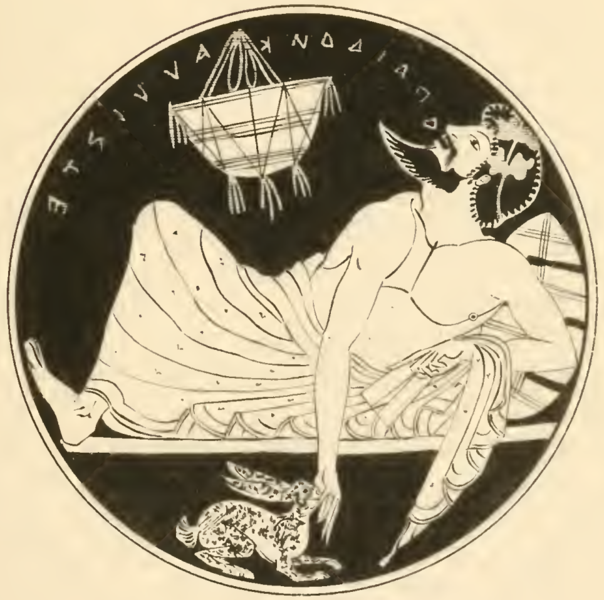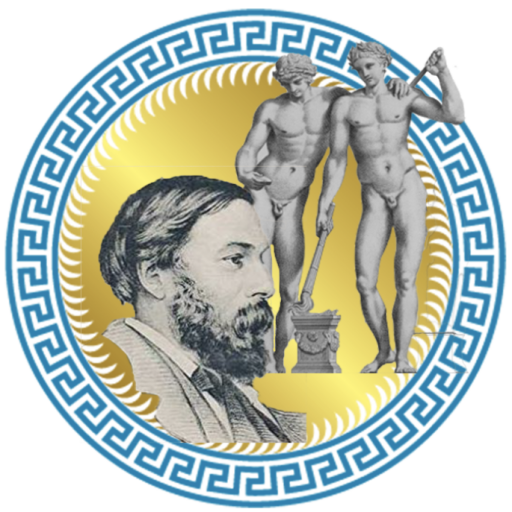
The poems of Theognis, as we know them today, could be considered a misnomer for the work. The collection under his name is collected from a variety of sources, some of which Symonds notes in his introduction to them in A Problem in Greek Ethics, like Solon. There is much ambiguity about which poems Theognis authored, and which ended up as part of his collection by circumstance. We know some are from authors that are not Theognis (like Solon) but others are left up for debate. Symonds seems to have embraced this aspect of the poems, if anything. Since many of these poems are adjacent to his interests, and from many eclectic sources, this seems to strengthen the use for which Symonds employs the poems for Section 11 of A Problem in Greek Ethics, where he points out certain passages from the poems that point to a broader application of paiderastia, specifically in the political sphere. Theognis used the earlier elegies both as personal letters to Kurnus (Cyrnus in some translations), his friend and junior, with whom a romantic relation seems wholly plausible, as well as political advice to navigate the Greek nobility. The later volumes are less personal, dealing with broader political topics and certain figures (such as Solon himself) where the ambiguity of authorship is introduced. This does, to an extent, validate Symonds’ exploration of paiderastia in the old Greek tradition. At least in Megara, Theognis’ home city, the practice seemed to be widespread and accepted, which would no doubt have piqued Symonds’ interest, if nothing else.
It’s quite clear Symonds was attracted to these poems, even saying they “reveal the very heart of a Greek lover,” in a passage from A Problem in Greek Ethics. Indeed, his memoir reveals how near and dear Theognis was to him. He mentions a couplet “in my heart’s ear” from Theognis in Chapter 10, before launching into a vivid description of what amounts to a dream of sexual ecstasy. Symonds would revisit the line in A Problem in Greek Ethics, using it as proof of paiderastia’s association with “manly sports and pleasures”.
“Happy he that loveth as he taketh his practice and when he goeth home sleepeth the day out with a fair lad.” (Elegy II. 1335-1336)
It’s perhaps hard to see what inspired such wonder in Symonds from a modern perspective, but if his memoirs are anything to judge by, they sparked in him an intense desire and “unwholesome poetry making”. It’s rather hard to deny that Symonds felt an intense personal connection to this particular couplet. If I may put my own speculation on it, it might have been the idea that it was acceptable, even a path to happiness, for a man to have homoerotic sexual desires. I imagine hearing that sort of ancient “wisdom”, if you’d call it that, would be vindicating and freeing having struggled with that desire for your whole life. For this reason, it seems appropriate Symonds would keep this particular passage close to the chest.
Later on in Memoirs, Symonds talks about his relationship with Norman, a sixth form from Clifton College. In reference, he talks about another passage from Theognis that is also discussed in Greek Ethics, this one about loyalty.
If thou lovest me and the heart within thee is loyal, be not my friend but in word, with heart and mind turned contrary; either love me with a whole heart, or disown me and hate me in open quarrel. Whosoever is in two minds with one tongue, he, Cyrnus, is a dangerous comrade, better as foe than friend. (Elegy II. 87-92)
He follows this quotation up in his memoirs by stating that Norman was never disloyal, and that it was his circumstances that made the relationship awkward (complicating factors like being married). If the other passage was one that gave Symonds solace, this one seemed like one that he internalized to highlight the strangeness and perhaps the perceived wrongness of his own circumstances. After all, it was Symonds who was the disloyal one in this relationship, in whichever direction you want to consider it. Maybe it spoke to him, on account of his own inability to fulfill the words of one who so openly practiced a subject he had a vested interest in. It was deeply personal, but this time in a way that highlighted the way he had to practice it in the shadows, rather than out in the open like the Greeks.
The last interesting thing about Theognis is that he never appears in any of Symonds’ letters. This suggests to me that his works were dissimilar to Plutarch or Plato, who he often discussed with contemporaries. It seems more to me that Theognis was someone that held passages that were very personal to him, but perhaps the overall works themselves were not of much intellectual interest. Maybe he kept them close, but not in a way that dominated his thought.
Works Cited:
Sean Brady and John Addington Symonds, “A Problem in Greek Ethics,” essay, in John Addington Symonds (1840-1893) and Homosexuality: a Critical Edition of Sources (Palgrave Macmillan, 2012)
Regis, Amber K. The Memoirs of John Addington Symonds: A Critical Edition. London: Palgrave Macmillan UK , 2016.
Theognis. Elegy and Iambus. with an English Translation by. J. M. Edmonds. Cambridge, MA. Harvard University Press. London. William Heinemann Ltd. 1931. 1.
Williams, T. Hudson. “Theognis and His Poems.” The Journal of Hellenic Studies, vol. 23, 1903, pp. 1–23. JSTOR, www.jstor.org/stable/623754.
